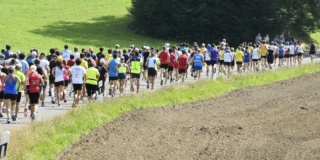
Interview with Maja Neuenschwander
Maja Neuenschwander's career experienced a preliminary climax three and a half years ago when she snatched the Swiss record from Franziska Rochat Moser at the Berlin Marathon. Through diligent training and continuity, she achieved something nobody would have thought she was capable of. After this, however, her career came to a halt. It now looks set to pick up again.
You were walking a fine line to the point that it was suddenly no longer about weekly kilometres and regenerative measures, but medical appointments and alternative forms of training instead. Can you tell us what happened after this high point and what is now finally putting you back on the road to success?
Over the past two years, I wasn’t able to «finish» a marathon due to a variety of reasons. In 2017, I was able to complete a 3-month preparatory phase without major difficulties, but then became «thwarted» in the London (spring) and Berlin (autumn) races. Once due to very severe muscle pain, once due to a strain. In 2018, I successfully kicked off the year with a personal best time in the half marathon. I then had to abort the preparatory phase for the European Championships in Berlin due to a fatigue fracture in my pubic bone.
As a result, I took a longer «sports break» to enable my body and mind to recover «properly». However, during this time I worked intensively on my muscular deficits and tried to eliminate the imbalances that «crept up» on me over the past few years. I also rearranged my sports environment and have been working part time at Swiss Olympic again.
I thus pursued completely different approaches, which makes it correspondingly difficult to name the actual measures that «helped» to get the ship back on course. One thing I learnt for certain is that after more than 10 years of high performance sports, my body demanded a longer break, which I was unwilling to give it.
You are currently preparing for your goals in Iten in the country of runners. You like to call Iten your «power place». What makes this place and the training there so special for you?
I have felt very comfortable here since the first time I visited Kenya in 2014. The whole «setting» really inspires and motivates me and at the same time brings me peace and serenity, which enables me to focus entirely on running. I know of no other place where so many people work on their personal running dreams and where I am duly respected as a runner. But I must also admit that I couldn’t imagine living here for a long time.
What changes have you made to your training to replicate your previous records?
The biggest adjustment for certain is that I currently no longer run 230-240 km a week. The most intensive week here in Kenya was between 210-220 km. In contrast to 2 years ago, I now deliberately incorporate an extra half day of regeneration with no running into my training program. We have also changed my strength training, but this is not as important as the adjustment to my running training.
Like you, many runners will be participating in a marathon this year. Can you give them 3 tips for the preparation and the race itself?
My tips for the preparation:
- Your training should be smart and focused: marathon training is a «balancing act» between too much and too little. During your preparation you should therefore switch from quantity to quality the closer the marathon gets. In the last couple of weeks, you should also do very intensive or regenerative training.
- Intersperse your training with long runs on a weekly basis: 22-40 km faster than an extensive continuous run.
- Periodisation: lay a solid foundation, pay attention to the necessary scope and train specifically for the marathon. After 2-3 weeks of training, deliberately incorporate a recovery week to ensure the body has time to recover and to let the training «take effect».
My tips for the race:
- A marathon is always a competition with yourself (not against others).
- You can plan for a lot of things during a marathon - but not everything! Be prepared for surprises and don’t let them unsettle you.
- Let the spectators «carry» you and enjoy it!
Do you have a secret tip you would be willing to share with us?
Promise yourself a reward! Marathon training is often tough and will push you to your mental and physical limits. To ensure my body & mind cooperate, I promise them a reward for successfully completing the race. This is like the famous «sausage» that I have in mind during the intensive phases and can then «enjoy» after crossing the finish line or in the next few days.
Foto: ZVG
Many thanks to Maja Neuenschwander for the exciting answers.
This may be of interest for you too


